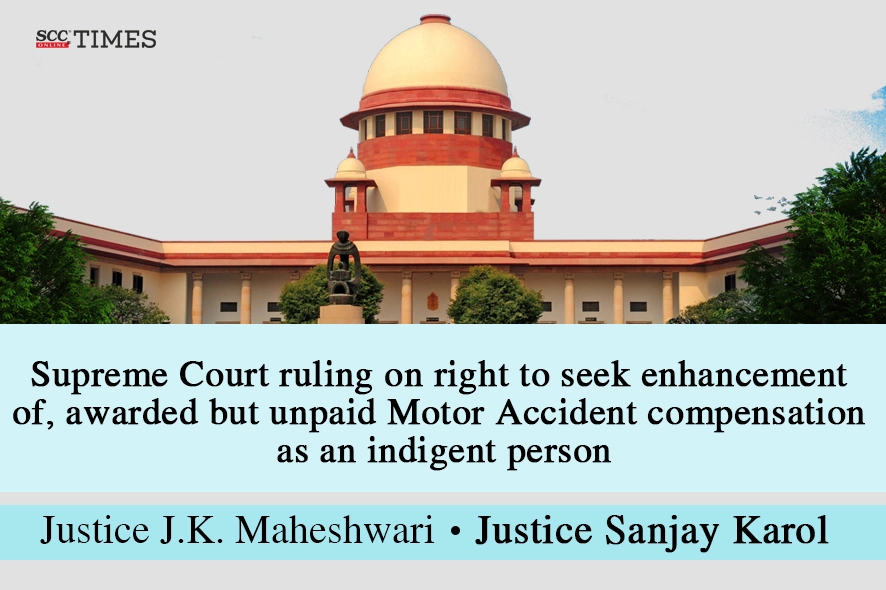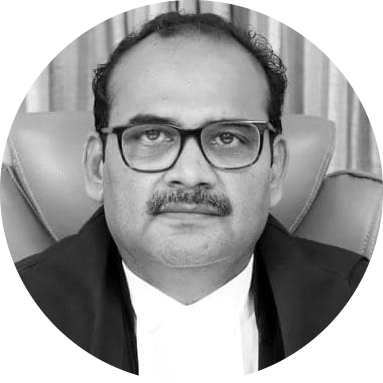Supreme Court: The Division Bench JK Maheshwari and Sanjay Karol*, JJ. answered the question that whether a person who is entitled to receive compensation by way of a claim before the Motor Accident Claims Tribunal can be said to have given up its status as an ‘indigent person’, by virtue of the amount slated to be received (compensation). The Court allowed the appeal to file an appeal as an ‘indigent person’, as her indigency was not extinguished by the compensation awarded, for she did not receive the money at the time of filing the appeal.
Factual Matrix
The appellant, (original claimant) before the Motor Accident Claims Tribunal, was injured in an accident while riding pillion on a bike, which was hit by a truck. Having sustained injuries, she was admitted for medical treatment at a hospital for a period of fourteen days and subsequently she underwent plastic surgery. At the time of the accident, her earning stood at Rs.3,000/- per month. After the accident she sustained permanent disablement, and was unable to work. A claim was filed for Rs.10 lakhs with 18% interest and costs. The Tribunal vide Award dated 17-10-2016, awarded a sum of Rs.2,41,745/- with 9% interest from the date of claim petition till the date of realization and proportionate costs. The appellant filed an application before the Gujarat High Court seeking permission to file appeal as an indigent person. However, the Court refused to consider the appellant as an indigent person.
Issue
Whether a person who is entitled to receive compensation by way of a claim before the Motor Accident Claims Tribunal can be said to have given up its status as an ‘indigent person’, by virtue of the amount slated to be received?
Analysis and Decision
The Court referred to Mathai M. Paikeday v. C.K. Antony, (2011) 13 SCC 174, wherein the concept of an indigent person has been discussed at length. It was observed that “a person may proceed as poor person only after a court is satisfied that he or she is unable to prosecute the suit and pay the costs and expenses. A person is indigent if the payment of fees would deprive one of basic living expenses, or if the person is in a state of impoverishment that substantially and effectively impairs or prevents the pursuit of a court remedy. However, a person need not be destitute. Factors considered when determining if a litigant is indigent are similar to those considered in criminal cases, and include the party’s employment status and income, including income from government sources such as social security and unemployment benefits, the ownership of unencumbered assets, including real or personal property and money on deposit, the party’s total indebtedness, and any financial assistance received from family or close friends. Not only personal liquid assets, but also alternative sources of money should be considered.”
Further, the Court referred to R.V. Dev v. Chief Secy., Govt. of Kerala, (2007) 5 SCC 698, wherein, the operation of Rule 1 of Order XLIV of Code of Civil Procedure, 1908 (‘CPC’), which deals with appeal filed as an indigent person. The Court said that Orders XXXIII and XLIV of the CPC exemplifies the cherished principle that lack of monetary capability does not preclude a person from knocking on the doors of the Court to seek vindication of his rights. It is unquestioned that a person dissatisfied with the amount of compensation received can file an appeal. The Court said that in the matter at hand, for a claim of Rs.10 lakhs, the Tribunal awarded compensation which was less than Rs. 2.5 lakhs. The Court noted that the ground, upon which the appellant’s application to file the appeal as an indigent person was rejected, was that she had received compensation by way of the Award of the Tribunal, and therefore, she was not indigent and said that the impugned order had belied the said recording of the High Court as it was on record that the appellant was not paid at that point in time. Hence, the Court said that even though was awarded a sum, her indigency was not extinguished thereby. Therefore, the Court held that the High Court was incorrect in rejecting the Application.
The Court reiterated that if the suit so filed, as an indigent person succeeds, the Court fee shall be deductible from the amount received as a result thereof as if the person who files the suit is not an indigent. The Court perused Order XLIV Rule 3(2) of the CPC which provides for inquiry as to whether applicant is an indigent person. The Court said that the Appellate Court, did not conduct any inquiry, in accordance with the Order XLIV Rule 3(2). The Court added that the same was necessitated since nothing brought out that the appellant filed the claim before the Tribunal as an indigent person, in which case she would be covered under Rule 3(1), which provides that no further inquiry would be required in respect of a person who was allowed to sue or appeal as an indigent person if they make an affidavit to the effect that they have not ceased to be an indigent unless the Government pleader objects or disputes such claim in which case an inquiry shall be held by the Appellate Court or under the orders thereof. Hence, the statutory requirement under the CPC, was not met.
Thus, the Court allowed the appeal and set aside the impugned decision. The Court granted liberty to the appellant to appeal as an indigent person. Further, considering the time-line of the matter, the Court requested the High Court that the appeal filed by the appellant be decided expeditiously, and preferably within a period of six months from the date of receipt of the copy of this judgment.
CASE DETAILS
|
Citation: Appellants : Respondents : |
Advocates who appeared in this case For the petitioner: For Respondent: |
CORAM :








